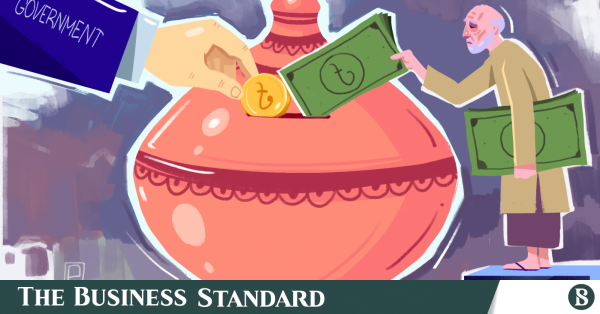
According to the National Pension Authority, 15,000 people have so far deposited Tk12.49 crore into the four pension schemes. The authority has invested Tk11.31 crore in 10-year Treasury bonds, which will yield an interest rate of 10.50%
Although the government launched the Universal Pension Scheme with great enthusiasm, the public response has not been as expected. In the first month, approximately 13,000 people enrolled in various pension schemes, but in the following month, the number dropped significantly to just 2,000.
According to the National Pension Authority, 15,000 people have so far deposited Tk12.49 crore into the four pension schemes. The authority has invested Tk11.31 crore in 10-year Treasury bonds, which will yield an interest rate of 10.50%.
A programme was held in the conference room of the finance ministry yesterday to provide information about the investment in the pension fund. Finance Minister AHM Mustafa Kamal, who attended as chief guest, also expressed his disappointment over the low enrolment in the pension schemes, stating, “It is disheartening.”
Prime Minister Sheikh Hasina inaugurated the pension programme on 17 August. It has four schemes for expatriate Bangladeshis, poor citizens of the country, and private sector employees, namely Pragati, Surokkha, Samata, and Prabas. Soon after the launch, the public responded well. In the first month till 16 September, 12,970 people registered. But next month, there was no expected response. As of 16 October, 1,669 people have joined the programme.
It was informed in yesterday’s event that 14,928 people have submitted contributions to four types of pensions till 22 October. A total of Tk12.49 crore has been deposited till date. Some 448 participants deposited Tk1.15 crore in Prabas scheme, and 6,719 participants deposited Tk6.66 crore in the Pragati scheme. And 6,078 people have deposited Tk4.30 crore in the Surokkha scheme, and 1,683 people have deposited Tk37.5 lakh in the Samata scheme.
In this situation, initiatives have been taken to make the schemes more attractive to increase public participation, said the pension authority’s executive chairman. It has been planned to provide some social benefits along with financial benefits to the inductees. Besides, a new slab has been introduced in the scheme “Prabas” for expatriates. From now on, expatriates will have the opportunity to join this scheme even if they deposit Tk2,000 per month.
Finance Minister AHM Mustafa Kamal said there are such initiatives in different countries around the world. South Korea’s pension fund has about $800 billion. Many countries raise capital from pension funds.
“This fund is safe and profitable. It will meet most of the needs of the people of Bangladesh, and everyone will benefit,” he said, and he expressed hope that the number of participants in the pension scheme will increase in the future.
Finance Secretary Md Khairuzzaman Majumdar said, as the interest was seen in the beginning, now there is no such interest. The authorities are trying to make pension schemes more attractive and popular.
He said the government has planned investment through the safe management of the money deposited in the pension fund.
Kabirul Ezdani Khan, executive chairman of the Pension Authority, said various questions are coming from different quarters about universal pension. The authorities have taken them into account and planned to make the schemes more attractive.
“Along with the financial benefits, some social benefits will gradually be added to it. Besides, pension fund investment rules are being framed. These rules are being made to invest the money in this fund on the basis of minimum risk and maximum profit,” he added.
For the past two years, journalists have had limited access to the finance minister for face-to-face meetings. Even when he was available on rare occasions, he seldom responded to journalists’ questions.
During the event yesterday, many journalists wished to pose questions to the finance minister after their meeting. However, he did not address all the questions and attempted to leave the venue multiple times when reporters requested answers. Eventually, he responded to a few questions at one point.
The first question posed to the finance minister was regarding inflation. Journalists expressed concerns about the rising prices of essential goods, which are becoming unaffordable for the common people. They inquired about the initiatives being taken to address this situation. Additionally, one journalist pointed out that if Sri Lanka can manage to control inflation, why can’t Bangladesh do the same?
In response, the finance minister stated that the government is actively taking measures to reduce the prices of daily necessities, including addressing inflation. He expressed confidence that inflation would decrease in the coming days.
He emphasised the importance of Bangladesh’s economy keeping pace with the rest of the world, despite the challenges faced. He remarked, “We are not having a good time. On one side, the war is stopping; on the other side, the war is going on.”
Regarding Sri Lanka, he said, Sri Lanka can learn to deal with the situation from Bangladesh. However, their tourism industry has created a huge opportunity to earn foreign exchange. Due to this, earning foreign currency has become easy. Bangladesh also has potential in tourism. Many people in the country go to Cox’s Bazar. It will increase further.
Answering another question, Mustafa Kamal said Bangladesh’s foreign exchange reserves are currently $20-22 billion. It is the driving force of the economy. The International Monetary Fund is pleased with Bangladesh’s achievements.
In response to another question, the finance minister said, “Small, medium, and large industries have survived because interest rates were kept at 9% and 6%. Even banks have survived. Or it wouldn’t last. The defaulted loans would have grown a lot.”






